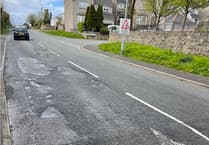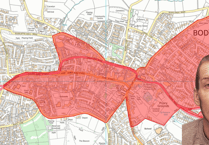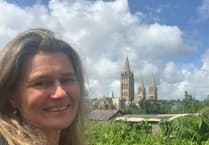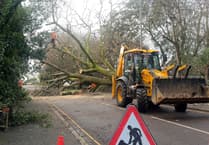THE BBC put on a series in which an elderly actor followed what were described as six great rides. I watched one take the driver up through the Wye Valley and Forest of Dean up to the Symonds Yat rock.
Somewhere, I think it was on the Parkend road, his producer had persuaded a typical Forest character, Henry Mills, sitting on a bench and with a number of sheep rambling around, to reveal to some of the millions who watched the programme some of our quaint little ways.
Henry introduced himself as a member of the Commoners' Association and referred to a 13th century charter which gave Foresters various rights in the same way as the famous Magna Carta of 1215.
These rights, however, are not about the rights of sheep to roam wherever they wish, but the rights of the king to take big royalties from the production of iron ore and other minerals.
These were in the past extremely valuable to the Crown and gave protection for miners to follow their trade on royal land.
As there is no common there are no common rights as, for instance in the New Forest, the title was cooked up by the Forestry Commission eager to end the long cold war with a very small group of local people who claim rights which have no legal basis.
They had an impressive ceremony at the Speech House introduced by blasts on a trumpet but the constitution as drawn up was based on goodwill which being totally lacking means that it is totally useless.
A week ago driving down the Parkend road there was a ewe lying in the middle of the road obviously having been struck by a passing vehicle.
When I returned some hours later the corpse had been removed and a couple of young lambs were desperately searching beside the road obviously looking for their mother. As for the great charter signed at Runnymede in June 1215 this was equally over hyped, it lasted only three weeks.
King John, under pressure from some of his barons and bishops, had allowed the royal seal to be attached to it. He then appealed to the Pope who ruled it invalid as King John had been forced to accept it under duress.
Its contents were with one tiny exception simply about maintaining the power and wealth of the bishops, the barons, and all the great landowners from arbitrary taxation imposed by the king.
King John was suffering the need for great austerity on account of his brother Richard fighting and beheading Muslims in the Holy Land. Seems sort of familiar.
I have great feeling of gratitude to Magna Carta. In 1952 I was taken to the school library to take several papers on history and literature which would give me an open scholarship to Oxford.
The library was furnished with a magnificent collection of books some of them quite valuable. No pupil was allowed in to the library which was only used for governors' meetings.
I had spent four years at school studying English history 1815-1915 but the paper before me required answers on four questions from two different centuries.
I looked up in desperation and above me on the wall was a picture of King John, the barons and above all the date of this event.
At least I knew the date and my answer must have been good because the grade of A+ was given which is the highest Oxford can give. I became the first boy in the school to jump this hurdle and go to Oxford, in part thanks to Magna Carta.
Apart from that neither you nor I have received any benefit from this document which has not and does not concern our much vaunted traditions whatever these might be.
What we need today is a new written constitution which protects and guides all citizens in the world of 2015.
When I emerged from the library the headmaster was waiting to inform me that King George VI had died.
He was upset when I showed no grief. At home my father gave me half a crown when the letter arrived offering me a scholarship. That really did surprise me.
– Roger Horsfield, Bream.




Comments
This article has no comments yet. Be the first to leave a comment.